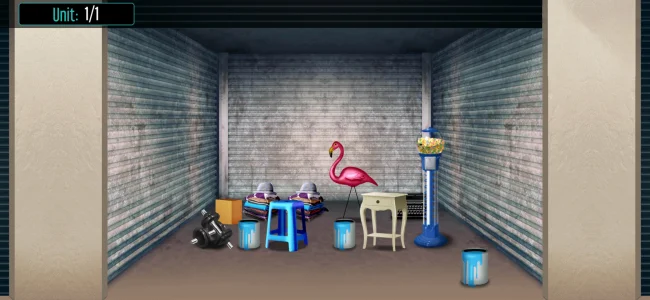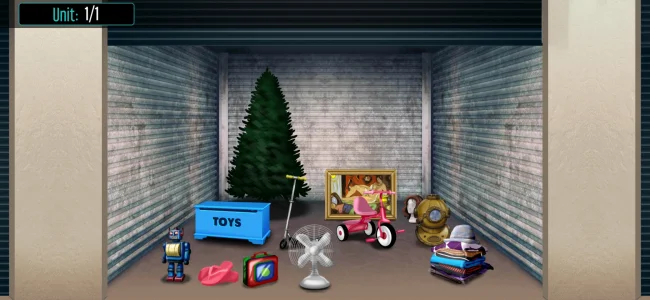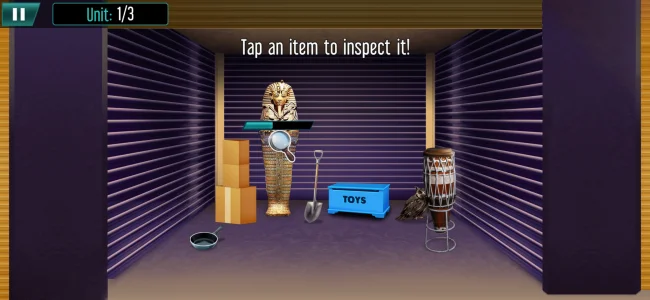Download Bid Wars 2: Business Simulator MOD Unlocked
*Bid Wars 2: Business Simulator* is a single-player strategy and simulation game developed by By Aliens L.L.C-F.Z. The core concept involves players participating in storage auctions against AI-controlled opponents to acquire valuable items. These goods are then sold for profit through a player-managed pawn shop. The primary objective is to accumulate wealth and expand the inherited family business into a city-wide commercial empire.
Gameplay Gallery



Bid Wars 2: Business Simulator Overview
An In-Depth Analysis of Bid Wars 2: Business Simulator
Bid Wars 2: Business Simulator emerges as a prominent title within the mobile gaming landscape, offering a specialized experience in the strategy and simulation genres. This article provides a comprehensive examination of its development, core mechanics, game modes, and technical specifications, drawing exclusively from detailed research material. The game presents players with the challenge of transforming a modest family business into a sprawling pawn shop empire by mastering the art of storage auctions. As a single-player, offline-capable experience, it carves a distinct niche for itself among casual and tycoon game enthusiasts on the Android and iOS platforms.Development and Publishing History
The title is currently developed and published by By Aliens L.L.C-F.Z, a mobile game publisher operating out of Dubai. The game's lineage, however, traces back to an original association with the developer Tapps Games. This transition in stewardship from Tapps Games to By Aliens L.L.C-F.Z represents a significant corporate event in the application's lifecycle, which often correlates with subsequent shifts in monetization strategies and update philosophies. The game is known by several official titles across various digital storefronts, including Bid Wars 2: Auction Simulator and Bid Wars 2: Pawn Shop Tycoon, all of which refer to the same application.Genre and Gameplay Classification
Bid Wars 2: Business Simulator is fundamentally classified as a strategy and simulation game. Its gameplay is further defined by several sub-genres, including management, tycoon, auction, and casual business simulation. This hybrid classification accurately reflects the multifaceted experience, which tasks players with not only strategic bidding but also with the long-term management of inventory, finances, and business expansion. The title receives regular maintenance updates, with a version history indicating a launch sometime between late 2018 and September 2021.Core Gameplay Mechanics and Objectives
The central premise of Bid Wars 2 revolves around the objective of accumulating wealth and expanding a business empire through the strategic acquisition and resale of goods from storage auctions. The experience is engineered around an engaging and repeatable gameplay loop that serves as the foundation for player progression and long-term engagement.The Primary Gameplay Loop
Player activity is structured around a continuous four-stage cycle. The first stage, Bidding, involves competing against AI-controlled opponents to win abandoned storage lockers. Success requires players to quickly assess the potential value of visible items and make calculated bids. The second stage, Acquisition, sees the player collecting the contents of the won locker, which can range from common items to rare collectibles. The third stage, Management and Sales, is central to the tycoon aspect, where items are displayed in the player's pawn shop and sold to NPC customers through negotiation. Finally, the Profit and Expansion stage allows the player to invest the generated revenue into upgrading their pawn shop and unlocking new, more profitable auction locations across a world map.Key Systems Governing Progression
Several underlying mechanics dictate the strategic depth and pacing of the game. These systems work in concert to create a complex economic simulation that players must navigate to succeed.- Bidding System: The auction mechanic pits the player against several AI rivals under a time limit. Player analysis suggests the AI may operate based on a hidden "reserve price" for each locker, bidding relentlessly until that value is met. This transforms the mechanic from a purely psychological battle into an economic calculation of whether the locker's contents are worth the game's predetermined price.
- Item Appraisal and Restoration: To maximize profit margins, players can have items appraised to discover their true market value. Certain high-value items, such as vehicles and antiques, can be restored, a process that significantly increases their resale price and adds a light crafting element to the simulation.
- Energy System: Gameplay sessions are gated by an energy mechanic, where each auction participation consumes a unit of energy. Once depleted, players must wait for it to regenerate over time, watch a rewarded advertisement, or use premium currency for an instant refill. This system directly influences the pace of free-to-play progression.
- Reputation and Leveling: Player progression is tracked through a reputation and leveling system. Accumulating wealth and completing objectives increases the player's level, which in turn unlocks access to higher-stakes auctions, more valuable item pools, and advanced business upgrades.
Game Modes and Content Structure
Bid Wars 2 is designed as a focused, single-player experience. The game intentionally omits any direct player-versus-player (PvP) multiplayer modes, instead concentrating on a robust solo campaign augmented by recurring live-service elements.Single-Player Career Experience
The primary game mode is a narrative-driven career where the player inherits a run-down family business with the goal of building it into a city-wide empire. This mode encompasses all core gameplay activities, including traveling to different auction houses, managing the pawn shop, and expanding business operations. A key feature frequently highlighted is its full offline playability, allowing users to engage with the core loop without requiring an active internet connection.Special Timed Events
To foster sustained engagement, the game incorporates special, time-limited events. These themed auctions, such as the "Speed and Prestige Auction" or holiday events, offer players the opportunity to acquire unique and rare items not available in the standard career mode. These events function as the game's main live-service component, creating urgency and encouraging regular participation. However, user feedback indicates that completing the collection sets associated with these events can be exceptionally challenging due to the low probability of obtaining the highest-tier items.Platform Availability and System Requirements
The title is engineered for mobile devices and is officially distributed on the Google Play Store for Android and the Apple App Store for iOS. Its compatibility extends to PC and Mac systems through the use of Android emulators such as BlueStacks, which allows the Android version to be played on a desktop computer.Mobile and Emulator Specifications
For Android users, the game requires an operating system of Android 8.1.0 (Oreo) or newer, with an APK file size of approximately 243.5 MB. For iOS devices, iOS 15.0 or later is necessary, with an application size of around 237.6 MB. Users wishing to play via an emulator on a PC or Mac will need a minimum of 4 GB of RAM and at least 10 GB of free disk space to accommodate both the emulator and the game application.Monetization Model and Player Experience
Bid Wars 2 employs a free-to-play economic model, generating revenue through a combination of optional in-app purchases and a pervasive advertising system. This model significantly shapes the gameplay experience, particularly for non-paying users.In-App Purchases and Advertising
The in-game shop offers various microtransactions, including packs of premium currency (Gold), bundles of resources, and utility purchases like a permanent "Ad Blocker." The advertising system is twofold. It includes optional rewarded video ads that players can watch for bonuses, such as a 30% boost to a sale's value. It also features mandatory interstitial (full-screen) ads that frequently interrupt gameplay between activities. User reviews consistently cite the high frequency of these mandatory ads and the game's tendency to freeze or crash after an ad plays as major points of frustration.Free-to-Play Viability
Progression through the entire career mode without spending real money is entirely possible. However, the free-to-play path is characterized by mechanics designed to incentivize spending. Non-paying players must contend with the restrictive energy system limiting playtime, long real-world wait timers for actions like opening safes, and constant interruptions from advertisements. The game is not "pay-to-win" in a competitive sense, but its design heavily encourages purchases to remove these "frustration mechanics" for a smoother experience.Technical Profile and APK Installation
For users on the Android platform, understanding the technical details of the APK file is crucial for a successful installation outside of the official Google Play Store. The game's structure simplifies this process compared to other large mobile applications.File Specifications and Installation Process
The Bid Wars 2 application is contained within a single APK file, typically around 243.5 MB in size. It does not utilize a separate OBB (Opaque Binary Blob) data file, meaning all necessary assets are included in the primary installation package. To install the APK, users must first enable the "Install unknown apps" permission in their device's security settings. After downloading the file from a trusted source, the user can simply tap the file to initiate the installation process. It is critical to ensure sufficient storage space is available and that any previous versions are not uninstalled beforehand, as doing so may delete local save data.Final Analysis and Recommendation
Bid Wars 2: Business Simulator successfully delivers an addictive and satisfying core loop based on the "buy low, sell high" fantasy of storage auctions. Its strengths are found in its deep collection system, a tangible sense of business progression, and its valuable offline play capability. The game is ideally suited for fans of casual, single-player simulation and tycoon titles who enjoy inventory management and economic strategy. However, prospective players must approach the game with an awareness of its aggressive monetization framework. The experience is heavily influenced by frequent ad interruptions and time-gating mechanics that can disrupt the flow of gameplay. For players who can tolerate these free-to-play systems, or for those willing to purchase the ad-free option, Bid Wars 2 offers a robust and engaging business simulation that provides many hours of strategic entertainment.An Analytical Guide to Bid Wars 2: Business Simulator
Bid Wars 2: Business Simulator is a strategy simulation game developed by By Aliens L.L.C-F.Z. The game places players in the role of a business owner tasked with building a profitable pawn shop empire. Players engage in storage auctions, acquire valuable items, and manage their business to accumulate wealth. The experience combines elements of tycoon, management, and collection games within a single-player framework, offering a progression-focused challenge that is playable offline.
The Core Gameplay Loop: Bidding, Collecting, and Selling
The central gameplay of Bid Wars 2 revolves around a continuous and rewarding cycle of activities. This loop forms the foundation of the player’s journey from a small-time shop owner to a city-wide tycoon. The primary objective requires mastering each phase of this cycle to maximize profit and fuel expansion. Player progression directly correlates with their efficiency in executing these core actions.
The gameplay sequence begins with bidding. Players travel to various locations on a world map to participate in storage auctions. They compete against AI-controlled rivals to win abandoned storage lockers. Success in this phase demands quick assessment of visible goods and decisive bidding. Upon winning an auction, players acquire the locker’s contents. The game features a vast catalog of items, ranging from common junk to rare collectibles, antiques, and even vehicles. These items form the player’s inventory, which is the primary source of all future revenue. The final phase involves management and sales. Players transport the collected items to their pawn shop, display them for sale, and negotiate prices with NPC customers to generate profit. The revenue earned is then reinvested to upgrade the business, unlocking more lucrative auctions and expanding the empire.
Gameplay Modes and Progression Systems
Bid Wars 2 structures its experience around a primary career mode, augmented by recurring special events. The game is a dedicated single-player experience, with all competition occurring against computer-controlled opponents.
Career Mode and Business Expansion
The main game mode follows a narrative where the player inherits a family business and aims to achieve massive success. Progression in this mode is linear and is measured by a leveling and reputation system. Every successful item sale contributes experience points, which in turn increase the player’s level. Leveling up serves as the primary mechanism for unlocking new game content. Higher levels grant players access to new, higher-stakes auction locations on the world map. These advanced locations contain more valuable and rarer items, which are essential for growing profits. The ultimate goal is to purchase new buildings and expand the business across the entire city, solidifying the player’s status as a business magnate.
Special Timed Events
To provide ongoing engagement, the game incorporates special timed events. These are themed auctions, such as the “Speed and Prestige Auction,” that become available for a limited duration. These events function as the game’s live-service component, offering players the chance to acquire unique items not found in the standard career auctions. Completing the item collections associated with these events presents a significant challenge, as the highest-tier items have an extremely low probability of appearing. These events require players to strategically focus their resources and energy to obtain exclusive rewards.
Understanding Core Gameplay Mechanics
Player success in Bid Wars 2 is dependent on understanding and manipulating several key systems that govern auctions, sales, and resource management.
The Auction and Bidding System
The auction mechanic pits the player against three to four AI opponents in a timed bidding war. A critical strategic consideration is the behavior of the AI. Analysis suggests the AI may not operate with complex strategic logic but instead bids relentlessly up to a hidden, predetermined “reserve price” for each locker. This transforms the bidding phase from a psychological battle into an economic calculation. The player’s primary skill becomes accurately estimating a locker’s value and deciding if that value justifies the game’s implicit asking price, rather than simply outbidding rivals.
Pawn Shop and Inventory Management
The pawn shop is the economic engine of the player’s empire. Players must effectively manage limited shelf space to display items for sale. This system requires prioritizing high-value goods to maximize cash flow. NPC customers enter the shop and make offers on displayed items. Players can accept these offers or, in some cases, negotiate for a higher price. Efficient inventory turnover is essential for maintaining a steady income stream to fund participation in new auctions.
Item Appraisal and Restoration
To maximize profit, the game includes mechanics for value enhancement. Players can have certain items appraised to reveal their true market value and historical context, which often increases their sale price. Furthermore, a restoration system allows players to repair valuable objects like antiques or vehicles. This light crafting mechanic significantly boosts an item’s value, turning a modest find into a highly profitable asset and adding another layer of strategic depth to inventory management.
The Energy System
Gameplay sessions are regulated by an energy system. Participating in any auction consumes a unit of energy. Once the player’s energy is depleted, they must wait for it to regenerate over time or use other means to refill it. This mechanic gates player activity, limiting the number of auctions they can enter in a single session and requiring strategic decisions about which opportunities to pursue.
Mastering the Gameplay Cycle: A Step-by-Step Approach
New players can achieve early success by following a structured approach to the game’s core loop. This process outlines the path from the first auction to reinvesting initial profits for growth.
- Enter an Auction: The player begins by selecting an available auction from the map, an action which consumes energy.
- Analyze and Bid: The player visually assesses the items within the opened storage locker to form a value estimate. They then engage in the bidding process by tapping the “BID” button to compete against AI opponents.
- Collect Winnings: After winning an auction, the player selects the most valuable items from the locker to take back to their shop, respecting their initial inventory capacity.
- Manage the Pawn Shop: In the shop, the player places these items on empty display shelves to offer them for sale.
- Negotiate and Sell: The player serves incoming NPC customers by evaluating their offers. Accepting an offer completes the sale, generating both cash and experience points.
- Reinvest and Expand: The accumulated cash and experience lead to level-ups, which unlock new auction venues, advanced features like item restoration, and the ability to expand the business empire.
Advanced Strategies for Profit Maximization
Experienced players can employ several advanced tactics to optimize their performance and accelerate their progress through the game.
- Refine Bidding Tactics: Players should establish a firm walk-away price for every auction based on a conservative estimate of the locker’s contents to avoid unprofitable wins. Paying close attention to the behavior of different AI characters can reveal patterns, allowing players to tailor their bidding style to the specific rivals present.
- Optimize Economic Throughput: Inventory management is paramount. Players must prioritize displaying and selling their most valuable items first to free up limited shelf space for new, profitable goods. Using optional rewarded ad bonuses strategically on high-value sales provides a significant income boost.
- Develop a Keen Eye for Value: Some of the most valuable items, such as gems or rare collectibles, are small and easily overlooked. Players should train themselves to spot these treasures hidden within cluttered lockers. Additionally, targeting specific “blind auctions” for categories like electronics can be more profitable, as their item pools often contain a higher density of rare objects.
